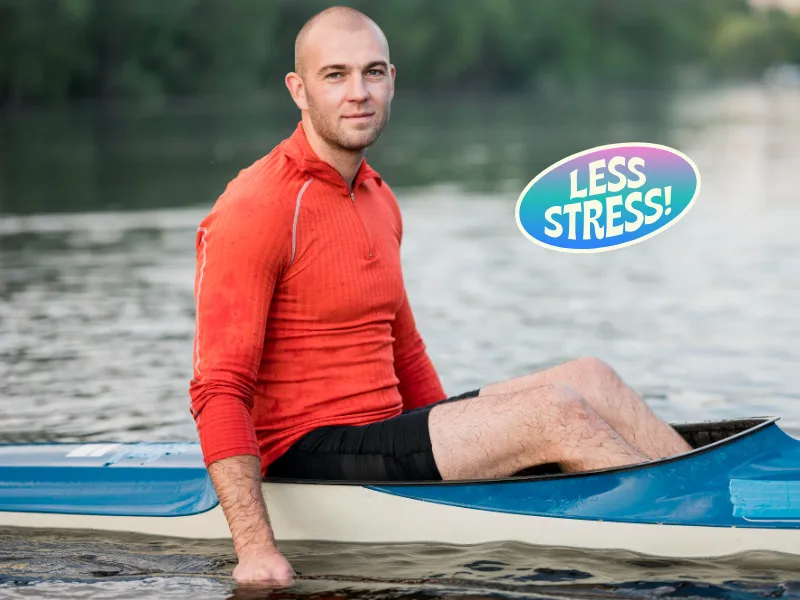Benefits of Boating for Mental Health
Published: 26 Apr 2025
Can something as simple as floating on a boat really ease anxiety or depression? It sounds too easy, right? But what if that little trip on the water is more powerful than you think?
The benefits of boating for mental health go way beyond just “feeling relaxed.” They affect brain chemistry, emotions, and even focus.
Stick around to discover how a few hours on the water might change how your mind feels, thinks, and heals.
1- How Boating Heals the Mind: The Science Explained
Think of your brain like a computer that’s running too many tabs. Emails, deadlines, worries—it’s all running in the background. Now, imagine hitting the reset button. That’s what boating does for your mind.

1.1 The Blue Space Effect: Why Water Instantly Calms You
Researchers call it the Blue Space Effect. It means that just being near natural water, whether it’s a river, sea, or lake, can boost your mood and reduce stress. (1)

Why? Because our brains are wired to feel safe and relaxed around water. Some experts say humans are naturally drawn to water the same way we’re drawn to fresh air and sunshine.
According to a study, people who live near coastal areas report better mental well-being than those who live inland. (2)
1.2 Boating & Brainwaves: Entering a Meditative State
When you’re on the water, your brain actually changes how it works. It starts producing more alpha brainwaves, the same kind we see during deep relaxation and light meditation. (3)

These brainwaves help you feel:
- Calm
- Creative
- Focused
- Emotionally balanced
It’s like your mind slows down and says, “Ahh, finally some peace.”
1.3 Boating Reduces Cortisol Naturally
You’ve probably heard of cortisol, the “stress hormone.” High levels of it are linked to anxiety, sleep problems, and even belly fat.
But here’s the good news: studies show that spending time in nature, especially near water, can lower cortisol levels significantly. (4)

And when you’re boating, you’re surrounded by blue space, gentle sounds, fresh air, and movement. It’s a perfect combo for stress relief.
| 2- Top 6 Mental Health Benefits of Boating You Should Know |
|---|
Boating isn’t just fun, it’s powerful therapy without the white coat. From calming anxiety to clearing your mind, let’s explore how this simple activity can work wonders for your mental health. 2.1 Boating: A Natural Stress & Anxiety ReliefYou know that feeling when life gets too loud? Boating turns down the volume.
 2.2 How Boating Lifts Your Mood and Fights SadnessSun, breeze, and water; nature’s happy team.
 Pro Tip Go boating during sunrise or sunset for that golden glow and double the calm. 2.3 Mental Clarity: Why Boating Clears Your HeadCan’t think straight? Try a boat ride.
It’s like giving your mind a clean slate.  2.4 Boating Teaches You to Be PresentBoating slows everything down. And that’s a good thing.
In my experience, even 20 minutes on a boat feels like a mini mental vacation. It’s one of the rare times when doing nothing actually helps you heal. 2.5 Stronger Bonds, Happier Mind: The Social Side of BoatingBoating creates special moments together.
Stronger connections = stronger minds.  2.6 A Peaceful Reset: Boating as a Healthy EscapeLet’s be real, sometimes we all want to run away from it all. Boating lets you do that safely.
Many people say boating feels like a peaceful reset button for their emotions.  |
3. Who Should Try Boating for Mental Health?
Boating isn’t just for adventure lovers or vacationers. It’s actually healing for the mind, and almost anyone can benefit from it in some way.
Let’s see who it helps the most:
3.1 People with Anxiety, Depression, or Burnout
If your mind feels heavy, tired, or constantly on edge, boating might be your quiet space.
- Anxiety? The calming motion and peaceful environment help you breathe easier.
- Depression? Being out in the sunlight and fresh air boosts happy hormones like serotonin.
- Burnout? Boating gives you the escape your brain has been begging for.

3.2 College Students & Overworked Professionals
Between deadlines, emails, and mental overload, it’s easy to forget what peace feels like.
- College students often face academic pressure, loneliness, and screen fatigue.
- Professionals juggle long hours, tight schedules, and mental clutter.
A simple boat ride can help your mind reset, like closing all the tabs in your brain.

3.3 Older Adults and Seniors
As we age, mental peace becomes even more precious.
- Boating offers a gentle, low-impact activity that soothes the mind and body.
- It helps combat feelings of isolation or restlessness, especially in retirees.
Even a short outing can bring joy and calm into their daily life.

3.4 Children with Attention Issues or Autism
With gentle care and supervision, boating can be incredibly soothing for kids.
- The rhythmic motion, minimal distractions, and natural scenery can calm overstimulated minds.
- Some parents say their child feels “more grounded” and focused after time on the water.
Always ensure proper safety measures and adapt the experience based on the child’s needs.
4- Quick Quiz: Is Boating Good for Your Mental Health?
Let’s have a little fun! Take this quick quiz to find out if boating could be the perfect mental health boost for you:
1. Do you feel better around water?
- A) Yes, I feel instantly relaxed near lakes, oceans, or rivers.
- B) Sometimes, depending on the situation.
- C) No, I don’t really notice much difference.
2. Do you enjoy being unplugged from your phone or digital devices?
- A) Absolutely, I love disconnecting from the digital world.
- B) I try to, but it’s tough.
- C) Not really, I feel uneasy without my phone.
3. Are you looking for calm without medication?
- A) Yes, I want natural ways to feel at peace.
- B) Occasionally, but I rely on other methods too.
- C) No, I prefer other methods of relaxation.
4. Do you find that being out in nature makes you feel more at ease?
- A) Yes, nature has a way of calming me down.
- B) Sometimes, depending on the place.
- C) Not really, I don’t feel much change.
5. Do you enjoy slow, mindful activities like walking, fishing, or reading?
- A) Yes, I love these types of peaceful activities.
- B) Sometimes, but I prefer something a bit more active.
- C) Not really, I enjoy faster-paced activities.
Score:
- 4–5 Yes: Get on that boat! You’re ready to experience the mental health benefits of boating! Try it out, and see how it transforms your mood.
- 2–3 Yes: Try it once—you might be surprised. You may not be fully convinced yet, but give it a go. Boating might just be the calming activity you need.
- 0–1 Yes: Maybe start by sitting near water first. If you’re unsure, begin by spending time near a lake or beach. Even sitting quietly near water can have a soothing effect!
Curious to learn more? Check out our next article on
5- Conclusion: Benefits of Boating for Mental Health
So, guys, in this article, we’ve covered the topic “Benefits of Boating for Mental Health” in detail. Boating offers not only a peaceful escape but also a natural way to recharge your mind and body.
Personally, I find it incredibly refreshing and calming, especially when life gets busy. If you’re looking for a simple, effective way to boost your mental well-being, I highly recommend incorporating boating into your routine.
Found this helpful? Share it with your friends and drop a comment below if you have any questions.
6- FAQs
Boating offers many mental health benefits, like reducing anxiety, improving mood, promoting mindfulness, and providing an opportunity for social bonding. It’s a fun, peaceful way to escape daily stresses.
Yes! Boating helps reduce stress, improve mood, and boost focus. The calmness of water and fresh air can leave you feeling relaxed and refreshed.
Being near the sea can help lower stress levels, improve mood, and even boost creativity. The soothing sounds of the waves and the vastness of the ocean can create a sense of peace and clarity.
Water plays a significant role in mental well-being. Just being near water can have a calming effect, reduce anxiety, and help clear the mind. It’s often referred to as “blue space” because of its therapeutic qualities.
Yes, studies show that simply looking at water can improve mood and reduce feelings of stress. The calming effect of water helps people feel more relaxed and focused.
Yes, dehydration can lead to irritability, difficulty concentrating, and even anxiety. Staying hydrated is crucial for maintaining both physical and mental health.
Water provides a natural sense of calm, which helps reduce stress and anxiety. Being near water or spending time on it gives our brain a break from overstimulation, offering peace and mental clarity.
Absolutely! Water therapy, such as swimming or simply being near water, can help reduce stress, improve mood, and provide mental relaxation. Many people use water therapy as a form of mindfulness practice.
The gentle rocking of the boat and the peaceful environment around you can calm your nervous system, reducing the physical symptoms of anxiety. Plus, the distraction of being on the water helps take your mind off stressors.
Yes, spending time on the water can help lift your mood by providing a peaceful, distraction-free environment. The sense of freedom and connection with nature can be uplifting for those experiencing depression.
7-References
At MedicaWire, all medically sensitive content is reviewed by licensed healthcare professionals. Our team ensures that the information you read is accurate, up-to-date, and based on trusted medical sources.
Learn how we maintain high standards by reading our Editorial Policy.
📚 Sources
1- Georgiou, M., Morison, G., Smith, N., Tieges, Z., & Chastin, S. (2021). Mechanisms of Impact of Blue Spaces on Human Health: A Systematic Literature Review and Meta-Analysis. International Journal of Environmental Research and Public Health, 18(5), 2486. https://doi.org/10.3390/ijerph18052486
https://pmc.ncbi.nlm.nih.gov/articles/PMC7967635
2- White, M. P., Elliott, L. R., Gascon, M., Roberts, B., & Fleming, L. E. (2020). Blue space, health and well-being: A narrative overview and synthesis of potential benefits. Environmental Research, 191, 110169. https://doi.org/10.1016/j.envres.2020.110169
https://www.sciencedirect.com/science/article/pii/S001393512031066
3- Grassini, S., Segurini, G. V., & Koivisto, M. (2022). Watching Nature Videos Promotes Physiological Restoration: Evidence From the Modulation of Alpha Waves in Electroencephalography. Frontiers in Psychology, 13, 871143. https://doi.org/10.3389/fpsyg.2022.871143
4- Jimenez, M. P., DeVille, N. V., Elliott, E. G., Schiff, J. E., Wilt, G. E., Hart, J. E., & James, P. (2021). Associations between Nature Exposure and Health: A Review of the Evidence. International Journal of Environmental Research and Public Health, 18(9), 4790. https://doi.org/10.3390/ijerph18094790
ℹ️ Our Promise
MedicaWire follows strict sourcing guidelines and only references peer-reviewed studies, academic institutions, and reputable medical associations. We update content regularly to reflect new health information.

- Be Respectful
- Stay Relevant
- Stay Positive
- True Feedback
- Encourage Discussion
- Avoid Spamming
- No Fake News
- Don't Copy-Paste
- No Personal Attacks



- Be Respectful
- Stay Relevant
- Stay Positive
- True Feedback
- Encourage Discussion
- Avoid Spamming
- No Fake News
- Don't Copy-Paste
- No Personal Attacks




